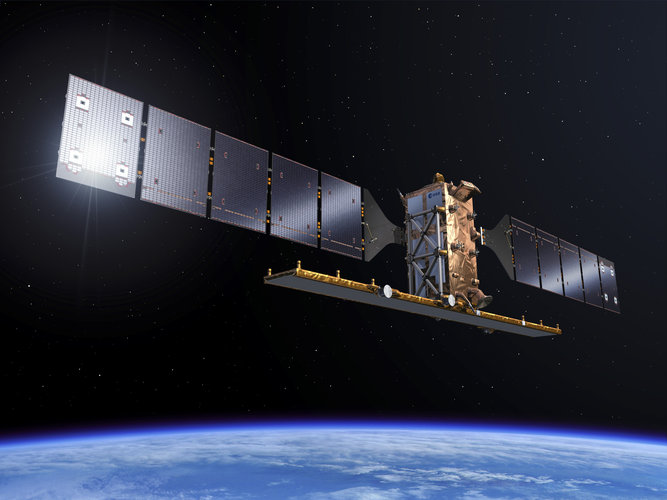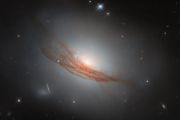
Copernical Team
Space Force Funds $35M Space Propulsion Institute Led by U-M
 To advance the development of versatile spacecraft propulsion systems, the U.S. Space Force has awarded $35 million to a national research initiative headed by the University of Michigan. The new Space Power and Propulsion for Agility, Responsiveness and Resilience Institute aims to integrate rapid-response chemical rockets with efficient electric propulsion dr
To advance the development of versatile spacecraft propulsion systems, the U.S. Space Force has awarded $35 million to a national research initiative headed by the University of Michigan. The new Space Power and Propulsion for Agility, Responsiveness and Resilience Institute aims to integrate rapid-response chemical rockets with efficient electric propulsion dr SpaceX launches OneWeb 20 mission
 A set of satellites for the European internet provider EutelsatOneWeb were successfully launched by SpaceX late Saturday night.
The satellites were launched by a Falcon 9 rocket from SLC-4Eat the Vandenberg Space Force Base in California around 10:13 p.m. local time. The rocket's first-stage booster landed on a landing pad about eight minutes after the launch.
"Deployment of OneW
A set of satellites for the European internet provider EutelsatOneWeb were successfully launched by SpaceX late Saturday night.
The satellites were launched by a Falcon 9 rocket from SLC-4Eat the Vandenberg Space Force Base in California around 10:13 p.m. local time. The rocket's first-stage booster landed on a landing pad about eight minutes after the launch.
"Deployment of OneW Perseverance just keeps roving across Mars
 Throughout the past week, Perseverance has continued marching up the Jezero crater rim. This steep ascent through the Martian regolith (soil) can prove to be slow driving for the rover, as the wheels can slip on the steepest areas. This is like trying to run up a hill of sand on a beach - with every step forward, you also slip back a little way down the hill! This just means the Science and Engi
Throughout the past week, Perseverance has continued marching up the Jezero crater rim. This steep ascent through the Martian regolith (soil) can prove to be slow driving for the rover, as the wheels can slip on the steepest areas. This is like trying to run up a hill of sand on a beach - with every step forward, you also slip back a little way down the hill! This just means the Science and Engi Shrouded axions may surround neutron stars
 Physicists from the universities of Amsterdam, Princeton, and Oxford have uncovered evidence that extremely light particles, known as axions, may form large clouds around neutron stars. These particles could help explain dark matter, one of the greatest mysteries in physics, and might even be detectable with current technology.
The new research, published in 'Physical Review X', builds on
Physicists from the universities of Amsterdam, Princeton, and Oxford have uncovered evidence that extremely light particles, known as axions, may form large clouds around neutron stars. These particles could help explain dark matter, one of the greatest mysteries in physics, and might even be detectable with current technology.
The new research, published in 'Physical Review X', builds on US Space Force awards SpaceX over $733M for national security launch services
 The US Space Force's Space Systems Command (SSC) has awarded SpaceX two National Security Space Launch (NSSL) Phase 3 Lane 1 Launch Service Task Orders (LSTOs), totaling $733,566,001. These task orders are the first under an Indefinite Delivery Indefinite Quantity (IDIQ) contract awarded in June 2024 and include one task order for seven Space Development Agency (SDA) launches and another for a N
The US Space Force's Space Systems Command (SSC) has awarded SpaceX two National Security Space Launch (NSSL) Phase 3 Lane 1 Launch Service Task Orders (LSTOs), totaling $733,566,001. These task orders are the first under an Indefinite Delivery Indefinite Quantity (IDIQ) contract awarded in June 2024 and include one task order for seven Space Development Agency (SDA) launches and another for a N Call for interest: Sentinel-1C launch media event

Call for interest: Sentinel-1C launch media event
First coherent picture of atomic nucleus structure achieved using quarks and gluons
 Physicists have long understood that protons and neutrons, which make up atomic nuclei, are composed of quarks bound by gluons. However, reproducing the properties of atomic nuclei using only these subatomic components has been a challenge. Now, researchers from the Institute of Nuclear Physics of the Polish Academy of Sciences in Cracow, working with the international nCTEQ collaboration, have
Physicists have long understood that protons and neutrons, which make up atomic nuclei, are composed of quarks bound by gluons. However, reproducing the properties of atomic nuclei using only these subatomic components has been a challenge. Now, researchers from the Institute of Nuclear Physics of the Polish Academy of Sciences in Cracow, working with the international nCTEQ collaboration, have Rain may have helped form the first cells, kick-starting life as we know it
 Billions of years of evolution have made modern cells incredibly complex. Inside cells are small compartments called organelles that perform specific functions essential for the cell's survival and operation. For instance, the nucleus stores genetic material, and mitochondria produce energy.
Another essential part of a cell is the membrane that encloses it. Proteins embedded on the surface
Billions of years of evolution have made modern cells incredibly complex. Inside cells are small compartments called organelles that perform specific functions essential for the cell's survival and operation. For instance, the nucleus stores genetic material, and mitochondria produce energy.
Another essential part of a cell is the membrane that encloses it. Proteins embedded on the surface China's underground lab seeks answer to deep scientific riddle
 Far beneath the lush landscape of southern China, a sprawling subterranean laboratory aims to be the world's first to crack a deep scientific enigma.
China has emerged as a science powerhouse in recent years, with the country's Communist leadership ploughing billions of dollars into advanced research to contend with the United States and other rivals.
Its latest showpiece is the Jiangmen
Far beneath the lush landscape of southern China, a sprawling subterranean laboratory aims to be the world's first to crack a deep scientific enigma.
China has emerged as a science powerhouse in recent years, with the country's Communist leadership ploughing billions of dollars into advanced research to contend with the United States and other rivals.
Its latest showpiece is the Jiangmen 
































